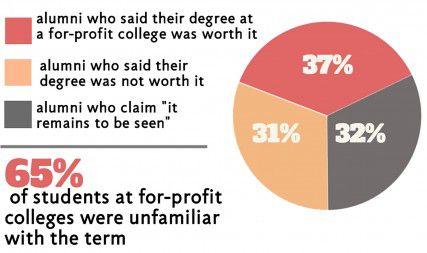
While a new study points out that many college students are unable to distinguish between for-profit and nonprofit universities, students at Boston University are unaware of BU’s not-for-profit status.
“For-profit schools are owned by their investors, who expect to profit from their investment, said Jay Halfond, an associate professor of administrative sciences at Metropolitan College. “This puts pressure on these schools to constantly increase enrollments and revenues, no matter what it takes. Not-for-profit schools … are expected to operate in the public interest, and are exempt from taxes and permitted to raise funds from donors.”
The study, which was released by the nonprofit research group Public Agenda, examined the understanding for-profit universities had of the implications of that status, said Public Agenda Director of Research Carolin Hagelskamp.
“The Profiting Higher Education study is on undergraduates who are currently enrolled at for-profit universities, alumni and employers’ views and experiences with the for-profit higher education sector,” Hagelskamp said. “The words ‘for-profit college’ are very prominent among higher education leaders and policy-makers.”
The study found that although the students surveyed attended for-profit schools, they were often unaware of the meaning behind the term “for-profit,” Hagelskamp said.
“We found that the term itself is so unknown and so not thought about,” she said. “Even undergraduates at for-profit colleges said absolutely nothing comes to mind when they hear the term … This shows that the term itself is not something students really think about.”
Hagelskamp said the lack of awareness among students of the profit agenda of their schools did not signify a lack of interest.
“We also know from our qualitative work that once you give students the chance to think through these concepts of how a school is governed, funded, what its mission is and how for-profit and nonprofit admission might be different, we found in our focus groups that our prospective students are really interested in these conversations, and it really changes the way they think about their college choices,” she said.
For-profit universities have accumulated a negative reputation due to the underhanded recruitment tactics of certain schools, Halfond said.
“There have been far more scandals and concerns with the overly aggressive tactics of for-profits,” he said. “Many have recruited new students in misleading ways [such as] promising success, encouraging debt, pushing prospective students to enroll. In general, nonprofits operate more idealistically and ethically.”
BU is a nonprofit institution of higher education, said BU spokesman Colin Riley.
“We are nonprofit,” Riley said. “The vast majority of schools are non-profit … It really shouldn’t matter to the student, except if they’re not getting the quality of education they expect to be getting.”
Halfond said nonprofit universities are ideal for the spectrum of educational enrichment they can provide without the restrictions of providing a profit for investors.
“The for-profits rarely invent anything new — they simply take a few of the programs the nonprofits invented and create a mass market for them,” he said. “The nonprofits, like BU, represent the truly creative setting for a broad range of educational programs and disciplines.”
Several students were unable to determine whether BU is for-profit or not-for-profit.
Emma Grillet, a College of Arts and Sciences sophomore, said she could guess that BU was not-for-profit, but could not think of a reason why she thinks so.
“I think it’s a non-profit, but I have no idea,” she said, “I guess for-profit is just to make more money to keep for themselves, while non-profit is put towards buying stuff for the student. I just said BU was non-profit off the top of my head because I think I’ve heard it before.”
Victoria De La Vega, a Sargent College of Health and Rehabilitation Sciences freshman, said BU’s pricey tuition leads her to surmise that it is a for-profit university, even though it is a not-for profit institution.
“I like to think it’s nonprofit, because it makes me feel better,” she said. “BU is so expensive though, that it makes me think it might be for-profit.”


















































































































